5 Things to Ask a Plumbing Contractor

Prior to hiring a plumbing contractor, it’s a good idea to ask plenty of questions. Photo: San Jose Plumbing, Inc. ©2019
Whether you need your sink drain cleared, your water heater repaired or your sewer line replaced, chances are you’ll be calling the same type of service provider: a plumbing contractor. To ensure a quality job, it’s wise to ask a plumber plenty of questions before hiring. Besides verifying proper licensing and insurance, here are a few things you should consider asking.
1. What’s your pricing structure?
In the past, almost all plumbers charged by the hour for their services. While this is still common, a growing number of contractors are opting instead for a flat-rate pricing structure—in other words, charging by the job rather than by the hour. The main benefit of flat-rate pricing is it lets customers know what they’re going to pay in advance. Also, since the job’s price isn’t determined by the amount of time it takes to complete, it removes any motivation for a plumber to “milk the clock.” This isn’t to say there’s anything wrong with charging by the hour—plenty of reputable plumbers still use this pricing structure. But for those with budget anxiety, a flat-rate structure can provide added assurance.
Of course, it should be noted that even flat-rate pricing is subject to change. If new developments arise during the job, the contractor may need to modify the price to reflect the changed circumstances. Regardless of the situation, knowing a plumber’s pricing structure in advance will help establish the right expectations.
2. Where do you get your parts and products?
While most homeowners instinctively go to home supply stores to buy plumbing products, Jonatan Bautista, owner of Oro Pro Plumbing, Inc., says your plumbing contractor shouldn’t. “A professional plumber should get their fixtures from a plumbing distributor. Few consumers realize that the quality of these fixtures is higher than those found at home supply stores. This is because big-box stores often have fixtures’ heavy duty brass inner parts changed out for plastic parts, which allows the stores to sell them for a lower price. In contrast, a plumbing distributor’s products come as they were designed, fitted with high-quality materials both inside and out.”
Because of their superior quality, Mr. Bautista says it’s common for fixtures bought from a plumbing distributor to have double the life span of those purchased at a home supply store. That’s why it’s a good idea to ask a plumber contractor where they source their parts and products.
3. Does the product make sense for my home?
Even if it represents the most cutting-edge technology, a plumbing product’s viability can vary depending on the application. For example, Nic Ratel of Water Heaters Only, Inc. says that while tankless water heaters work well in smaller homes, they aren’t as practical for large homes where water must travel long distances to reach fixtures. “Since tankless water heaters function ‘on demand,’ longer water line distances mean longer unit run times, which leads to increased energy consumption. Additionally, long distances to fixtures results in a ‘cold water sandwich,’ where the cold water in the pipe has to run out before the hot water can arrive. For these reasons, tankless water heaters typically won’t deliver optimal performance or energy savings in large houses.”
The same principle applies to modern plumbing techniques. Take trenchless sewer replacement—while this method works great in many situations, there are some where it doesn’t. For example, when a sewer line contains drastic changes in direction, the pipe bursting head may not be able to navigate the bends. Likewise, if there are multiple “bellies” in the line, trenchless replacement won’t resolve the underlying problem.
To avoid diminishing returns or persisting problems, ask your plumbing contractor about the viability of the products or methods you want to utilize.
4. How can I reduce water consumption in my home?
After decades of water conservation efforts, residential plumbing systems are much more water-efficient than they once were. However, while low-flow toilets and faucet aerators have become standard, there are other water-saving products that have yet to be adopted on a broad scale. One example is the hot water recirculation pump, a device that reduces wait times for hot water at sinks and showers. Through a complex dual process, hot water recirculation pumps provide a dual benefit: they deliver near-instant hot water and conserve thousands of gallons of water per year, per fixture. What’s more, they aren’t that expensive to install and often pay for themselves within a short period of time.
Considering the benefits (water saved equals money saved, after all), it’s worthwhile to ask your plumbing contractor about ways to reduce water consumption in your home, regardless of the work you’re having done.
5. Do you offer a service agreement program?
Unfortunately, many homeowners ignore their plumbing systems until an issue arises, which usually results in the need for expensive repairs. A more cost-effective approach is to plan for preventive inspection and maintenance. One of the best ways to do this is to contract a service agreement with a local plumbing company.
A service agreement is essentially a customer loyalty program that some plumbers offer. It typically includes an annual inspection and service of your home’s plumbing system, which will help keep it performing optimally and minimize the need for repairs. Some plumbing contractors also offer service agreement subscribers discounted rates for service calls, waived emergency and off-hour fees, and priority customer service. Ask your plumbing contractor if they offer a service agreement and what the terms are.
Use Diamond Certified Resource to find top rated companies.
Local, Top Rated Diamond Certified Companies Related to Your Topic
San Francisco Plumbers
Marin County Plumbers
Santa Clara County Plumbers
Alameda County Plumbers
Solano County Plumbers
Related Articles
The Homeowner's Guide to Plumbing
Get Expert Advice From Owners of Top Rated Local Companies
Become a Diamond Certified Preferred Member (Always Free)